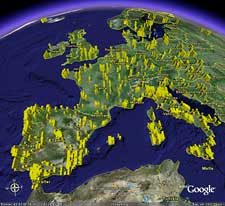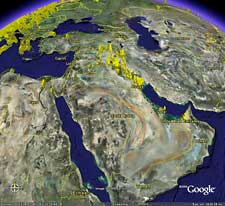A new version of Google Earth is available for download - for Windows 2000/XP, MAC OS 10.3.9 +, and Linux - with an improved user interface (or so it seemed to me). The extent of Google Earth's high resolution coverage (you can see individual buildings and cars at high resolution) is gradually increasing, though there are wide variations, with Iraq, for example, rather better covered than much of Europe, as the thumbnails above indicate.
Recent Posts
- A leaving speech
- How algorithms manipulate the market
- Clayton Wright's Educational Technology and Education Conferences, January to June 2016
- Alphabet
- Paul Mason's Postcapitalism - talk and discussion
- FE Area Based Reviews should start by making an assessment of need
- Citizen Maths - powerful ideas in action
- Robotics - someone who ran DARPA's Robotics Challenge looks ahead
- On the long-term future of artificial intelligence
- A ten year old interview
Recent Comments
- David Hughes on A leaving speech
- Liz Perry on A leaving speech
- Khaled on If ever you need a really comprehensive "title" drop-down
- Mark Sosa on If ever you need a really comprehensive "title" drop-down
- Richard Stacy on Video and Online Learning: Critical Reflections and Findings From the Field
- Mike Jones on "The Facebook" Kyle McGrath's August 2005 assessment
- G Kelly on Syria-related readings
- Kris Sittler on Second report from Keith Devlin's and Coursera’s Introduction to Mathematical Thinking MOOC
- Robert McGuire on Second report from Keith Devlin's and Coursera’s Introduction to Mathematical Thinking MOOC
- Keith Devlin on Second report from Keith Devlin's and Coursera’s Introduction to Mathematical Thinking MOOC






$100 laptop could reach users by July 2007
According to this 2 January 2007 story on the BBC web site, the first batch of so called "XO" computers built for the One Laptop Per Child (OLPC) project could reach users by July this year, with test machines to be issued in February. The BBC piece quotes Nicholas Negroponte, whose brainchild the OLPC laptop is, as follows:
Plenty of pictures and commentary (some of it snide) here at engadget, and these previous posts from Fortnightly Mailing may also be of interest:
Posted on 02/01/2007 in News and comment | Permalink | Comments (0)
|